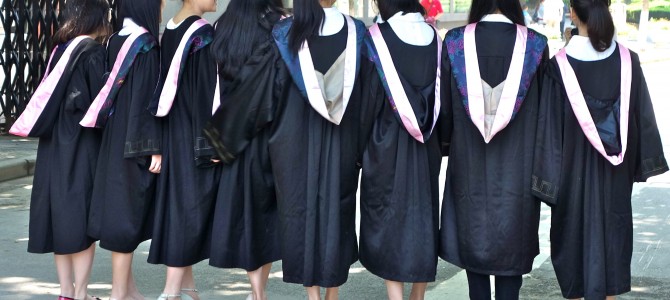Checking one’s privilege, rather than one’s soda intake, served as a refreshing message from former New York City Mayor Michael Bloomberg in his commencement address two weeks ago at Harvard University.
“Diversity of gender, ethnicity, and orientation is important,” he said. “But a university cannot be great if its faculty is politically homogenous.” And, “If tenure is going to continue to exist, it must also protect conservatives whose ideas run up against liberal norms.”
Bloomberg hinted at a core lesson from recent uproars over canceled commencement speakers and check-your-privilege dogma in higher education: The paramount privilege at universities is not race, class, or gender but intellectual soft despotism. More revealing, those who have pushed the check-your-privilege religion have not grasped this lesson.
A student whose worldview clings to that of university administrators and professors has the advantage of accessing university resources, money, and time to drive his cause. These instruments are far more powerful in granting benefits to politically preferred groups in higher education than subconscious biases in favor of particular races or classes.
I say this from personal experience. As president of a college Republican Club in 2008-09, I and other club members faced a thicket of explicit and implicit bureaucratic hurdles in advancing conservatism on a liberal college campus. These struggles came to the fore in the spring of 2009 when we hosted a speaker to discuss hate crimes. Protesters shouted down the speaker, forcing him to cancel his speech. The event had been ruined, but this heckler’s veto elicited a mere shrug from university officials, who agreed to reimburse us for the amount we paid the police officers, but not for anything else—the lecture-room fee, the speaker’s travel expenses, and other high costs.
My undergraduate school was an otherwise fine institution. But its hesitance to protect the free speech rights of those students whose political thought ran counter to liberal dogma was a prime example of the real privilege of intellectual homogeneity that infects college campuses.
Liberal ‘Micro-Aggression’ Abounds
Implicit acts of intellectual congruity—or “micro-aggressions,” in check-your-privilege parlance—are no less powerful in molding students’ minds into believing political discourse is acceptable only within certain boundaries. Subconscious decisions to assign course readings polished with a liberal slant; use class time to disproportionately cover liberal paradigms; and grade “conservative” arguments more critically in writing assignments are inevitable in a field in which 96 percent of Ivy League professors showered political contributions on President Barack Obama’s reelection campaign, and in a field in which almost 90 percent of its members self-identify politically as “far left,” “liberal,” or “middle of the road.”
Claiming this point is meaningless because professors’ personal political predilections do not seep into course syllabi ignores a basic human fact. Confirmation bias, across all political spectrums, is as constant in human nature as death and taxes.
Most conservatives, classical liberals, civil libertarians, and the better angels of the Old Left(aka, real liberals—the New Left is a basket case for free speech) understand the menace of intellectual homogeneity. The latest numbers: Not one unambiguously conservative Republican spoke at the commencement for the nation’s top thirty colleges and universities in 2013 and 2014, according to a fivethirtyeight.com report; Democrats had a two-to-one advantage over Republicans in giving commencement speeches in 2014, according to CampusReform; and liberal commencement speakers had almost a five-to-one advantage over conservatives in the top 100 universities, according to Young America’s Foundation.
Intellectual Conformity: The Height of Privilege
Conservatives’ crying foul over political imbalance of commencement speeches is nothing new, but it has attained greater relevance in light of check-your-privilege dogmatism. The striking lesson about the reaction to Princeton University freshman Tal Fortgang’s now-infamous column on checking his privilege, then, is that hardly any check-your-privileger, in my research (the saving graces are people like this student), has realized that intellectual conformity is the height of privilege at universities. The root of this intellectual conformity in higher education, of course, is typically modern liberalism. But the same principle applies at conservative schools that also stifle liberal discourse on campus.
To face eye-to-eye with my fellow Millennials who embrace the check-your-privilege gospel: It is a privilege when your views conform with those of more than 90 percent of your professors. It is a privilege when your worldviews are blessed by a proliferation of like-minded commencement speakers and guest lecturers. And it is a privilege when you have university resources, money, and time within fingertips’ reach to wield to advance your political cause. Politically homogeneous micro-aggression: The privilege that doth not speak its name.
Hence, the challenge to check-your-privilegers is to demonstrate a self-awareness of this reality so they can work actively to foster freer flows of intellectual diversity, rather than smother alternative views by erecting a check-your-privilege Berlin Wall, dividing soft intellectual despotism on one side with political tolerance on the other.
That is assuming, of course, that the central purpose of formal education is intellectual advancement. The irony is that the privilege of intellectual soft despotism is a fatal disadvantage in the long run. Millennials, by failing to understand how political conformity is the cradle of cognitive inertia, will not have the strong thinking skills necessary to flourish in the future as self-critical individuals and drivers of public discourse.
So I have one humble piece of advice for check-your-privilegers.
Check your privilege.









